New pump labels in EU provide clarity on biofuels content

October 12, 2018
BY Ron Kotrba
The EU introduced a new, harmonized set of fuel labels Oct. 12 to give drivers better information on the suitability of fuels for their vehicles throughout Europe. The labels will help avoid misfueling and inform drivers on the environmental impact of their fueling choice, according the European Commission.
The growing diversity of fuels on the European market—numerous blends of ethanol, biodiesel, synthetic diesel, and a variety of gaseous fuels such as hydrogen, compressed natural gas, liquid natural gas and liquid propane gas—has created the need for clearer information on the fuels sold at fuel stations, the EC stated Oct. 12.
Ethanol blends for spark-ignition (“gasoline”) engines are now designated with a circle encompassing an “E” and a numeral to represent the blend concentration of ethanol, such as E5, E10 and E85.
Advertisement
Biodiesel blends for compression-ignition (“diesel”) engines are now designated with a square encompassing a “B” and a numeral to represent the blend concentration of biodiesel, such as B7, B10, B30, B50 and B100.
Synthetic diesel fuels are also designated with a square in which the letters “XTL” are displayed.
Gaseous fuels are designated with a diamond in which the abbreviations “CNG,” “H2,” “LNG” and “LPG” are used.
The French Federation of Oilseed and Protein Producers (FOP) said the new labeling requirements are in line with the actions led by the organization to reinforce an essential outlet for oilseed producers, “and make visible the green fuel from our territories,” FOP stated in a press release. “It also demonstrates the contribution of the French vegetable oils and proteins sector to the energy and ecological transition.”
Advertisement
FOP also noted that, in addition to B7, consumers will soon be able to choose B10 at the pump. “Authorized last June by the government, this new fuel, which contains up to 10 percent of biodiesel, symbolizes the ongoing efforts of the industry to participate in the decarbonization of transport, and accelerate the development of sustainable mobility,” FOP stated.
"This display of B7 and B10 at the pump is a positive signal for both French farmers and motorists,” said Arnaud Rousseau, president of the FOP. “By refueling B10, the French can choose to give a boost to French agriculture and make a gesture for the environment.”
For more information on the labeling requirements, click here.
Related Stories
Avfuel Corp., the leading independent supplier of aviation fuel and services, is expanding its sustainable aviation fuel (SAF) footprint with the addition of a new, strategic supply point in Denver, Colorado—the first of its kind in the region.
ATOBA Energy and Air Moana are partnering to implement scalable solutions for the supply of SAF. The collaboration aims to ensure long-term SAF availability while supporting local initiatives to develop sustainable fuel production in Tahiti.
Kintetsu World Express Inc. has signed an additional agreement with Hong Kong, China-based Cathay Pacific Airways for the use of sustainable aviation fuel (SAF). The agreement expands a three-year partnership between the two companies.
Broco Energy on July 17 announced a new partnership with the Massachusetts Port Authority (Massport) to deliver and transition Massport's fuel tanks to renewable diesel across its various facilities.
Shell Aviation, Accenture, and Amex GBT on July 10 announced Avelia is in the process of evolving to an industry solution with independent data hosting and a multi-supplier model helping users access the GHG benefits of SAF.
Upcoming Events










